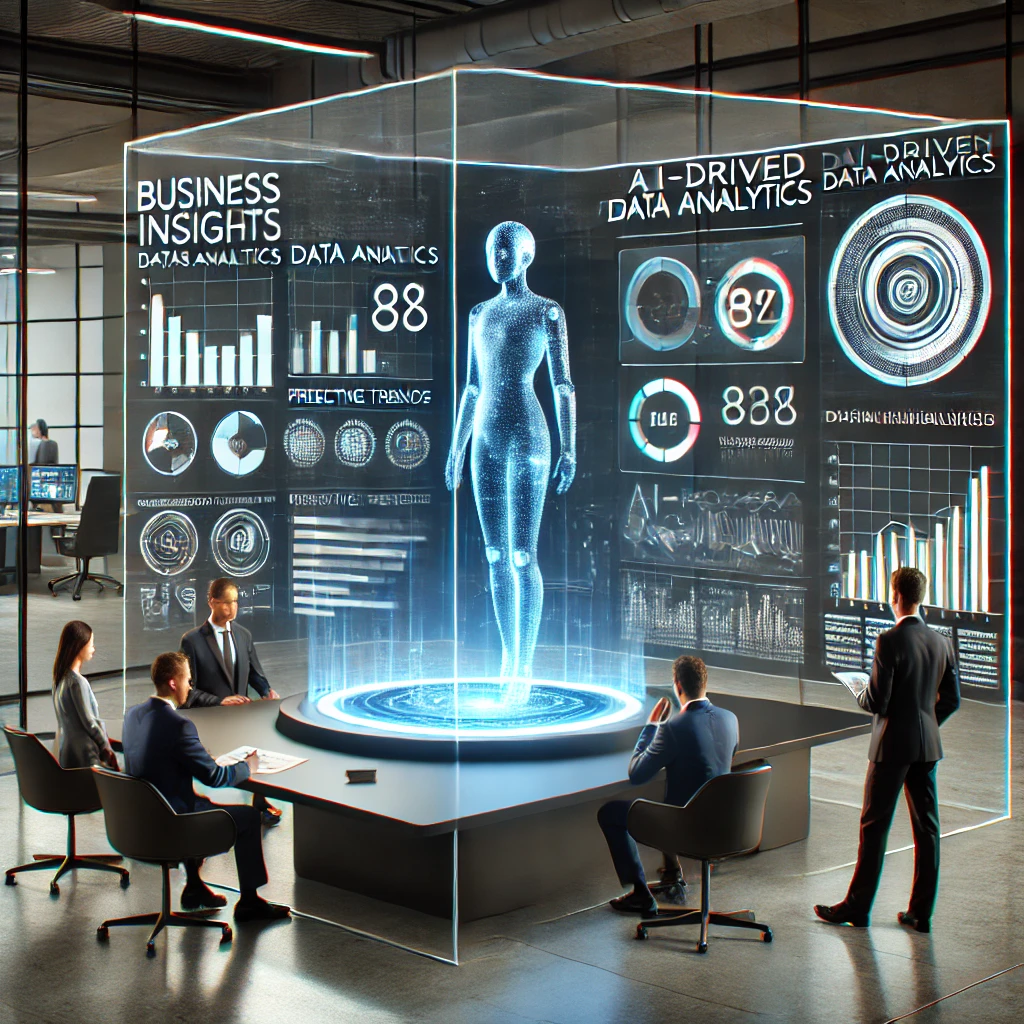In present day commercial enterprise panorama, companies are inundated with sizable amounts of records. While this statistics holds immense potential, the task lies in reworking it into actionable insights that drive strategic growth. Artificial intelligence (AI) is rising as an essential tool in helping businesses unlock the proper strength of their data, presenting advanced skills in choice-making, product innovation, and strategic planning. Businesses that effectively integrate AI into their operations are gaining a full-size competitive aspect, while people who lag in adoption hazard being left at the back of in an increasingly more statistics-pushed marketplace.
From Data Collection to Insight Generation
The evolution of business intelligence has undergone a thorough transformation. Previously, organizations depended on spreadsheets and basic records analytics to interpret marketplace tendencies. However, those traditional techniques had huge limitations, in particular whilst managing extensive and complicated datasets. AI has revolutionized this panorama, making it viable to process and analyze millions of statistics points in seconds, generating insights with great accuracy.
AI-Driven Business Intelligence
A significant shift has passed off in how corporations manage their facts. While companies as soon as focused primarily on records series, AI-powered analytics now emphasize clever interpretation and predictive modeling. These advanced tools permit organizations to pick out patterns, count on market tendencies, and generate suggestions with accuracy costs exceeding 90%, far surpassing traditional human evaluation.
According to Sarah Connolly, a information technology researcher at MIT, “AI has basically shifted the narrative. No longer are we limited through what facts we can acquire; we’re now focused on interpreting and anticipating styles. The purpose is actionable insight, not simply an accumulation of data.”
The transition from traditional statistics management to AI-driven intelligence is now not optionally available—it has become a crucial survival approach for agencies working in rapidly-changing industries. Research shows that companies making use of AI analytics revel in a 20–30% boom in operational performance and decision-making speed.
To obtain such transformative outcomes, corporations are leveraging three key AI technologies—machine gaining knowledge of, herbal language processing, and laptop imaginative and prescient. Together, those tools shape the inspiration of current business intelligence, permitting companies to extract extraordinary value from their records.
Machine Learning and Predictive Analytics
Machine studying (ML) has come to be a cornerstone of AI-driven enterprise intelligence. ML algorithms analyze historical statistics, discover styles, and predict destiny tendencies with precision levels ranging from 85–ninety five%. This predictive capability allows corporations to make records-driven choices that extensively enhance efficiency and strategic making plans.
Transforming Retail Operations
Retailers, for instance, are the use of ML-pushed predictive analytics to optimize inventory control and enhance client studies. Walmart, one in every of the biggest shops globally, utilizes ML to investigate giant volumes of consumer and supply chain facts. By predicting patron call primarily based on seasonal developments and purchasing behaviors, Walmart has accomplished a 30% reduction in inventory fees and a 15% boom in consumer delight.
Similarly, e-trade corporations consisting of Amazon use AI-powered recommendation engines to customize product tips, leading to increased sales and purchaser engagement. By analyzing buying history and surfing patterns, those systems power conversions and purchaser retention.
Enhancing Financial Risk Assessment
In the financial sector, predictive analytics plays an important position in danger evaluation and fraud detection. Financial establishments like JPMorgan Chase appoint state-of-the-art ML fashions to detect fraudulent transactions through studying actual-time spending behaviors. These AI-driven fraud detection structures have drastically decreased financial losses through figuring out suspicious activities early and stopping unauthorized transactions.
Natural Language Processing (NLP) for Enhanced Customer Insights
While system-gaining knowledge is effective at analyzing established information, herbal language processing (NLP) excels at decoding unstructured information assets together with patron opinions, emails, and social media interactions. Modern NLP systems can system tens of millions of patron interactions every day with sentiment accuracy exceeding 85%.
Sentiment Analysis for Brand Perception
Many companies leverage NLP-powered sentiment evaluation to gauge consumer delight and logo belief. For example, telecommunications large Verizon makes use of NLP to research purchaser comments and become aware of habitual proceedings. By addressing pain points rapidly, the corporation has decreased reaction times by 60% and elevated first-touch decisions with the aid of forty%.
AI Chatbots for Customer Engagement
Customer service is some other region wherein NLP is making a great effect. AI-powered chatbots can cope with hundreds of inquiries concurrently, presenting immediate responses and resolving commonplace troubles without human intervention. Companies like Sephora use chatbots to offer customized splendor tips, even as banks employ digital assistants to help customers manipulate their accounts and transactions correctly.
Computer Vision and Image Recognition
AI’s have an impact on extending past text and numbers, with pc vision playing a transformative position in industries requiring excessive levels of accuracy. With mistakes rates as little as 2%, AI-powered photo recognition systems often outperform human exams in specialised duties.
Revolutionizing Quality Control in Manufacturing
Manufacturers use computer vision for illness detection on assembly traces. AI-powered cameras and sensors test merchandise in real time, identifying inconsistencies and flaws before they attain consumers. Amazon’s achievement facilities leverage computer imaginative and prescient to enhance warehouse automation, decreasing choosing errors via seventy five% and improving processing speeds by 50%.

Healthcare Advancements with AI Diagnostics
In healthcare, AI-pushed image popularity is revolutionizing diagnostics. AI models trained on substantial datasets of clinical photos can stumble on illnesses like most cancers and diabetic retinopathy with first-rate accuracy. Hospitals worldwide are integrating AI-assisted diagnostic gear to aid radiologists in identifying early-degree clinical situations, leading to stepped forward patient outcomes and decreased diagnostic mistakes.
Real-World Success Stories: AI-Driven Insights Powering Growth
The adoption of AI-pushed enterprise intelligence has led to tangible achievement memories throughout diverse industries. Companies investing in AI solutions are witnessing sizable enhancements in performance, profitability, and consumer satisfaction.
Retail: Target’s Predictive Inventory Management
Target is a top example of AI’s transformative role in retail. By enforcing ML-pushed predictive analytics, the retailer optimizes inventory levels based on anticipated purchaser call for as opposed to past sales trends. This approach has significantly reduced stockouts and more desirable consumer delight whilst improving profitability.
Finance: Fraud Prevention in Banking
AI has additionally ended up a necessary device in monetary fraud prevention. Leading institutions, including Mastercard and Visa, employ AI-pushed fraud detection structures that analyze spending behaviors in actual time. These systems have efficiently minimized fraud-related losses and more desirable customer trust through flagging suspicious transactions earlier than they occur.
Healthcare: Personalized Treatment Plans
AI is making large strides in healthcare via enabling customized remedy techniques. Boston-primarily based Partners HealthCare makes use of AI models to research affected person statistics and tailor remedies for persistent situations. This records-driven method has led to progressed patient care and cost savings, demonstrating the ability of AI in cutting-edge medicine.
Challenges and Ethical Considerations
Despite its huge capability, AI adoption comes with first rate challenges and moral considerations. Businesses must navigate concerns associated with facts, privacy, algorithmic bias, and transparency in selection-making.
Data Privacy and Security
As corporations take care of growing quantities of private data, compliance with stringent policies including the GDPR and CCPA is vital. Companies should prioritize stable statistics storage, anonymization strategies, and robust cybersecurity measures to preserve client belief and regulatory compliance.
Addressing Algorithmic Bias
AI fashions are handiest as independent as the information they’re skilled on. If datasets contain ancient biases, AI algorithms may perpetuate discriminatory practices. A properly-documented instance is Amazon’s AI hiring tool, which was scrapped after exhibiting gender bias in opposition to lady candidates. Organizations must put into effect rigorous bias detection protocols to make sure fair AI-pushed selection-making.
Ensuring Transparency and Accountability
With AI gambling and an increasing number of extensive functions in essential selection-making, making sure transparency in AI-pushed insights is paramount. Explainable AI—in which customers can recognize the motive in the back of AI-generated choices—has become a critical requirement, especially in regulated sectors like finance and healthcare.
The Future of AI in Business Intelligence
Looking ahead, AI is expected to play an even greater role in enterprise intelligence. Emerging technology inclusive of reinforcement learning and edge computing will similarly decorate AI’s capabilities, allowing agencies to react and assume marketplace modifications with unheard of agility.
Experts are expecting that AI-driven hyper-personalization will permit agencies to tailor services and products with severe precision, leading to more advantageous purchaser engagement and retention.
The Strategic Imperative of AI for Growth
In nowadays dynamic commercial enterprise surroundings, AI is now not a luxury but a necessity. Organizations that harness AI to convert data into actionable insights will have a decisive competitive advantage. As corporations navigate moral and technological challenges, those that leverage AI responsibly will form the destiny of information-pushed increase and innovation.










